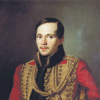Mikhail Lermontov

Mikhail Lermontov
Mikhail Yuryevich Lermontovwas a Russian Romantic writer, poet and painter, sometimes called "the poet of the Caucasus", the most important Russian poet after Alexander Pushkin's death in 1837 and the greatest figure in Russian Romanticism. His influence on later Russian literature is still felt in modern times, not only through his poetry, but also through his prose, which founded the tradition of the Russian psychological novel...
NationalityRussian
ProfessionPoet
Date of Birth15 October 1814
CountryRussian Federation
Evil spawns evil. The first experience of torture gives an understanding of the pleasure in tormenting others.
I am like a mariner born and bred on board a buccaneer brig whose soul has become so inured to storm and strife that if cast ashore he would weary and languish no matter how alluring the shady groves and how bright the gentle sun.
A strange thing, the human heart in general, and woman's heart in particular.
Out of life's storm I carried only a few ideas - and not one feeling.
Love, like fire, goes out without fuel.
I was modest--they accused me of being crafty: I became secretive. I felt deeply good and evil--nobody caressed me, everybody offended me: I became rancorous. I was gloomy--other children were merry and talkative. I felt myself superior to them--but was considered inferior: I became envious. I was ready to love the whole world--none understood me: and I learned to hate.
It is sad to see a young man's fondest hopes and dreams shattered when the rose-colured veil is plucked away and he sees the actions and feelings of men for what they are. But he still has the hope of replacing his old illusions with others, just as fleeting, but also just as sweet.
Happy people are ignoramuses and glory is nothing else but success, and to achieve it one only has to be cunning.
When we retire from the conventions of society and draw close to nature, we involuntarily become children: each attribute acquired by experience falls away from the soul, which becomes anew such as it was once and will surely be again.
One should never spurn a penitent criminal: in his despair he may become twice as much a criminal as before.
In people's eyes I readPages of malice and sin.
No good ever becomes of a man who forgets an old friend
The history of a man's soul, even the pettiest soul, is hardly less interesting and useful than the history of a whole people; especially when the former is the result of the observations of a mature mind upon itself, and has been written without any egotistical desire of arousing sympathy or astonishment. Rousseau's Confessions has precisely this defect – he read it to his friends.
We practically always excuse things when we understand them